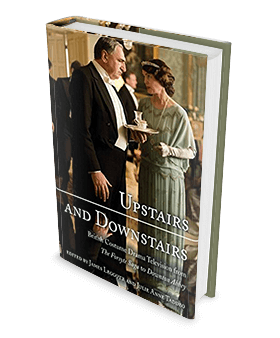- March 01, 2016
- By Karen Shih ’09
This weekend, it’s all over: You’ll see if Anna has her baby, if Barrow leaves the only job he’s ever known, and if Lady Edith finally gets a happy ending.
 “Downton Abbey,” ITV/PBS’ soapy saga of the Crawley family and its servants, with its impeccable Edwardian and Jazz Age costumes, period sets and antique automobiles, has captured American imaginations for six years. More than 10 million people are expected to watch the March 6 series finale—after which visiting Associate Professor Julie Taddeo expects they’ll be looking for their next British period drama fix.
“Downton Abbey,” ITV/PBS’ soapy saga of the Crawley family and its servants, with its impeccable Edwardian and Jazz Age costumes, period sets and antique automobiles, has captured American imaginations for six years. More than 10 million people are expected to watch the March 6 series finale—after which visiting Associate Professor Julie Taddeo expects they’ll be looking for their next British period drama fix.
“Escapism and fantasy and nostalgia are all important—we shouldn’t trivialize,” says Taddeo, who studies gender, class and sexuality in Victorian and 20th century Britain. “These shows help us understand more of the mindset of how people lived, the values of the time and how they were struggling with issues that were relevant then and are still relevant today.”
These include voting rights, access to contraception—the lack of which leads to Edith having a child out of wedlock—and rape, which devastates Anna, a lady’s maid.
“Julian Fellowes [the show’s creator] gets criticized for using it as a ratings device, but the way he handled the issue felt true to the time,” she says. “The shame the victim felt, the way she couldn’t tell anyone, not even her husband… Viewers get upset when the period drama is too realistic, but the reality is that any one of those women downstairs could have been raped by their employer or other male employees because that was a common occurrence.”
“Downton” also explores homosexuality through depressed butler Thomas Barrow, but Taddeo finds his portrayal as a conniving blackmailer unbelievable. “The truth is, he’s the one that would be blackmailed under the law. Why doesn’t Thomas just leave and go to London where there’s a thriving gay subculture in the 1920s?”
She and other scholars explored these issues in the 2014 volume “Upstairs and Downstairs: British Costume Drama Television from The Forsyte Saga to Downton Abbey,” which she edited. Now, she’s working on a new collection of essays on masculinity.
 Series that will appear in the book include the gritty “Peaky Blinders,” which follows a working-class gang facing post-traumatic stress disorder and drug addiction after World War I; the over-the-top “Penny Dreadful,” a mash-up of Victorian horror tropes that features supernatural men in the orbit of a demonically powerful woman; and “Banished,” which explores how convicts sent to Australia grappled with their lack of agency and inability to protect their women from the sexual demands of the British army.
Series that will appear in the book include the gritty “Peaky Blinders,” which follows a working-class gang facing post-traumatic stress disorder and drug addiction after World War I; the over-the-top “Penny Dreadful,” a mash-up of Victorian horror tropes that features supernatural men in the orbit of a demonically powerful woman; and “Banished,” which explores how convicts sent to Australia grappled with their lack of agency and inability to protect their women from the sexual demands of the British army.
In “Downton,” eroding masculine power is a recurring theme. “In the season on WWI, the Earl (of Grantham, aka Robert Crawley) gets to wear his uniform but doesn’t get to do anything else, while his wife and daughters find a whole new purpose, running a hospital on the estate. Matthew, the heir of the estate, is almost left impotent. The war emasculates and traumatizes many of the Downton men, upstairs and down,” she says.
Taddeo uses clips from the shows in her courses, which debunk myths and stereotypes about Victorians and explore the culture of the two world wars through memoirs and fiction.
“In the past, I wouldn’t have been so open about studying British popular culture,” says Taddeo. She grew up watching “Masterpiece Theatre” on PBS with her mom on Sunday nights and developed her love of history through adaptations of Charles Dickens’ works, the original “Poldark” and the 1995 “Pride and Prejudice” miniseries. “When ‘Downton Abbey’ came out and sparked this huge revival of period dramas, I wanted to take what was once a guilty pleasure and now as an adult historian look at it through different eyes… It’s another way to approach history and it’s the way that probably reaches the most audiences.”
So before the great Abbey closes its doors, look back at some of the most memorable scenes: former butler Molesley finding a teaching job that might let him leave service; Downton heir Matthew fighting alongside servant William in World War I; or the tradition-bound Dowager Countess’ inability to understand a “weekend”—you might find you’ve learned some history all along.
